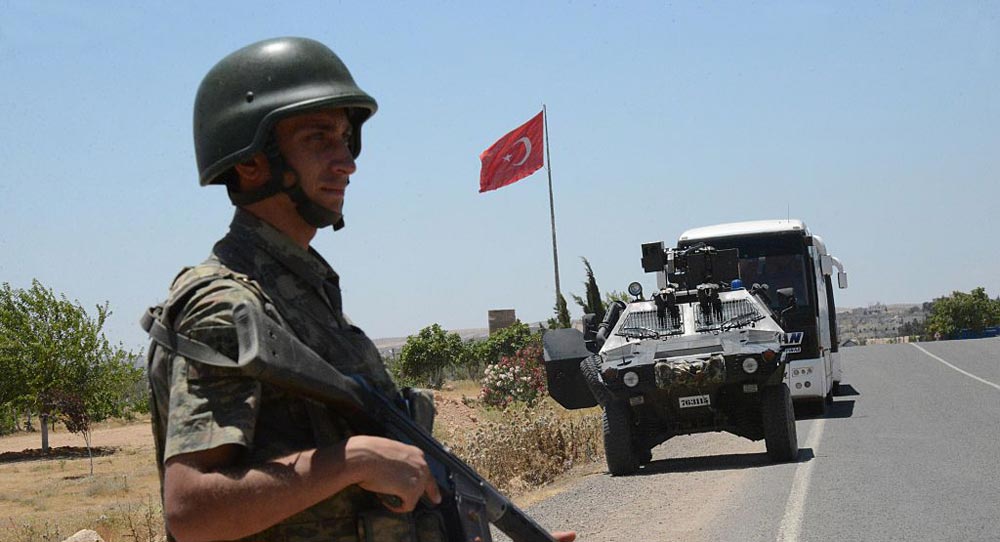Long gone are the happy days when Turkey’s foreign policy motto was “zero problems with neighbors.” Nowadays, Ankara is facing new diplomatic challenges on multiple fronts, at a time when domestic politics are more polarized than ever since the Justice and Development Party (AKP) came to power in 2002. The list of headaches is long, and the direction taken by Turkey remains hard to assert. The more Ankara’s leadership finds itself isolated from its traditional allies, the more it seems tempted to find solace in Russia’s arms and take refuge in an improbable regional role. These moves may prove risky bets for Turkish President Recep Tayyip Erdoğan.
The most immediate challenge is undoubtedly Syria’s war and future political settlement. As Turkey’s Kurds are being cleansed out of the political spectrum, the Iraqi Kurds are entertaining the notion of independence, with a referendum announced for September 25, a move immediately criticized by Ankara. Meanwhile, Turkey is watching with dismay as international support—primarily American—is given to the Syrian Kurds, including through substantial arms shipments from the United States and special forces support from the United States, France, the UK, and, in small part, Russia. Despite strident calls against what it dubs a political mistake, Ankara is set to watch the battle for Raqqa—the self-proclaimed Islamic State’s capital in Syria—take place without Turkish troops.
Ultimately, Ankara will have to accept that a political settlement include some form of political recognition for the Syrian Kurds. Turkey has no way to alter this course of events but insists that it is mistaken and threatens to retaliate if attacked by the Syrian Kurdish People’s Protection Units (YPG). On the diplomatic front, even if Turkey sits together with Russia and Iran in the protracted Astana process supposed to lead the way to a peace agreement, Ankara’s divergences with both Moscow (on the role of the Syrian Kurds and the fate of Syrian President Bashar al-Assad) and Tehran (on the role of Hezbollah in Syria’s war) remain deep.
In the wider region, another challenge has emerged for Turkey with some Arab countries. Bahrain, Egypt, Saudi Arabia, the United Arab Emirates, and Yemen (as well as the Maldives) have implemented a policy of isolation against Qatar, including by interrupting diplomatic relations, closing borders, suspending overflight rights for Qatar Airways, suspending flights of the Emirates and Etihad airlines to Qatar, and banning Qatari citizens from staying on their territories. The consequences of these measures are not fully known, but this is undoubtedly a drastic move against Turkey’s closest ally in the Arab world.
Ankara immediately offered its mediation in attempts at reconciliation, but this is unlikely to work because of two hard realities. One is that Turkey squarely sides with Qatar, including through a military agreement that was recently enhanced to increase the contingent of Turkish forces from under 100 to potentially several thousand. The other is the almost permanent litigation between Ankara and Cairo since the overthrow of former Egyptian president Mohamed Morsi by Abdel Fattah el-Sisi in 2013. It will be difficult to present Ankara as a neutral intermediary in one of the most acute intra-Arab disputes.
On a more general defense front, Turkey’s much-touted S-400 missile purchase from Russia seems to have made progress. According to official news sources in Moscow and Ankara, the technical and industrial aspects of the deal have been completed, and only the modalities of a Russian loan are pending. However, Ankara’s request for an industrial role in building the missiles seems to remain off-limits for Moscow.
If fully completed, the S-400 deal would represent a small diplomatic satisfaction for the Turkish leadership—a form of compensation for its isolation from the United States and the EU. More importantly, an agreement would be a strategic achievement for Russia, with the placement of a critical weapons system—inevitably flanked by a long-term training and operational assistance scheme—at the center of a major NATO member’s defense architecture.
Such a development would be unprecedented, which makes it highly attractive for the Kremlin. In such a scenario, Turkish pride would be satisfied, but Ankara would have somewhat estranged itself from the alliance. The reliability of the Turkish Armed Forces has already been substantially degraded since the failed coup of July 2016 and the massive purge that followed. Hardly a safe bet.
Oddly for a NATO member, Turkey has made the German military presence at İncirlik Air Base problematic by staunchly refusing to allow members of Germany’s Bundestag to visit the country’s troops participating in the anti–Islamic State coalition. As a result, the Luftwaffe will move its aircraft out of Turkey. The wider picture is that in its post–World War II culture, Berlin is taking immense precautions to manage what the German chancellor calls a “parliamentary army.” This goes together with a difficult debate about expanding Germany’s military operations abroad. By making this debate more complicated, Ankara is adding another hostile stance to its already very tense relationship with the EU.
In this complex picture, one could almost forget the EU-Turkey relationship, in which no progress is possible on subjects such as Turkey’s accession negotiations or visa facilitation, given the dismal state of the rule of law in the country. This was the gist of the brief talks between Erdoğan, European Council President Donald Tusk, and European Commission President Jean-Claude Juncker on May 25 in Brussels.
It is up to Ankara’s leadership to indicate whether it is willing to return to a rule-of-law architecture compatible with EU norms. Given domestic political priorities in Turkey, normalization with the EU will remain confined to political and economic dialogue, possible improvements in the EU-Turkey customs union, and ways to manage the March 2016 refugee deal.











